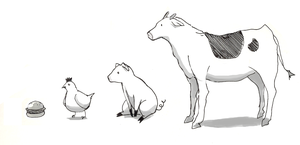Vegetarians, meat-eaters spar at event
Each time we take a bite out of a store-bought (oftentimes hormone-pumped) chicken leg, we are making — consciously or not — an ethical choice. To eat meat, or not to eat meat — that is now a valid ethical question.
Last Friday at Ground Zero Performance Café (unbearably hip, as always), the USC Levan Institute for Humanities and Ethics sponsored the second in a three-part series of Coffeehouse Conversations on Practical Ethics. Free food — including, unsurprisingly, an excess of vegetarian sandwiches — was provided.
Professor Sharon Lloyd moderated a panel of two fellow professors and a graduate student — Professor Edwin McCann, Professor John Strauss and Kory DeClark, a graduate student studying philosophy — as they chewed and ruminated, merrily or otherwise, on “The Ethics of Eating: Is It Possible to Eat with a Clear Conscience?”
McCann was the philosopher of the panel, Strauss was the economist and DeClark was the inquisitive student.
(Full disclosure: I take a class with McCann, and DeClark is the teacher’s assistant in that class; but fear not, dear reader, the leniency of my pen. I have no problem skewering their meaty — and not so meaty — arguments.)
In the first place, we should consider it a privilege to be able to speak frankly about the so-called ethics of eating. In much of the world, people subsist on the most meager portions of what Americans wouldn’t even consider real food.
For those with little resources, there are no ethical implications of eating; they eat what they can get, and they eat to survive. This notion of the ethics of eating is really a rich man’s dilemma — but an important dilemma nonetheless, as DeClark repeatedly emphasized.
DeClark, radically pro-vegetarian, spoke passionately on behalf of our furry and feathered friends, regurgitating familiar facts and figures to support his minority position: Animals, like humans, have rights because they can suffer.
As privileged Americans who do not need to eat meat, it is high time we devote serious thought to this notion of animal suffering. DeClark’s point is no longer as radical as it once was.
Strauss — whose contribution to the panel was mostly a tangential discussion of genetically modified food and other agricultural innovations — was wrong to dismiss DeClark as a bombastic activist. DeClark asked the right question: What are we doing — we who prize liberty above all — imprisoning helpless hens in small, vastly overcrowded, artificially lit cages, and forcing them to spend the whole of their pathetic lives pumping out egg after egg after egg?
(One lesson from that: All claustrophobics should be animal rights activists.)
It boils down to the “out of sight, out of mind” problem. Whipping up scrambled eggs each morning, few of us think seriously about the chickens that laid them, no doubt under inhumanly stressful circumstances. And those few who do make it a point of buying “cage-free” or “free-range” eggs ought to know that those labels are — if not for all intents and purposes — lies and shocking misrepresentations of an inconvenient reality.
However, DeClark undermined his position by calling all those who eat meat by choice — the vast majority of Americans, myself included — “morally reprehensible.” One can be carnivorous and still think the treatment of chickens in our factory farms is ethically bankrupt. To think these positions are mutually exclusive is to create a false dilemma.
McCann, philosophically anti-vegetarian, countered DeClark by saying he “puts [his] interests above a very large number of organisms,” and dismissed DeClark’s utilitarian liberationist ideology (à la Peter Singer) as “unqualified and universalistic.”
From a purely philosophical standpoint, McCann said, if we concede that the suffering of chickens is wrong, then we must also abandon antibiotic treatment, for that presumably causes the suffering of bacteria.
Obviously, McCann warps the point. Bacteria, we can presume, do not suffer as chickens or pigs or calves suffer; that is too big a leap to make. Using bacteria to prevent the spread of diseases is not like caging up chickens in small, dark places for weeks on end — which is not only cruel, but avoidable.
Of course, there are several economic and social reasons as to why we can’t put an end to current farming practices in one fell swoop, however deplorable they may be; but that does not mean we should simply accept animal cruelty as a fait accompli.
People do care, as evidenced by the passage last year of Proposition 2 in California, which will ensure, among other things, some leg room for our chickens by 2015 — a minor gain, but a step in the right direction.
And who knows? Perhaps vegetarianism will be the future — maybe meat eating will eventually be regarded as a repulsive notion. It isn’t too farfetched a notion. Save the chickens, save the world.
Jason Kehe is a sophomore majoring in print journalism. His column, “Small Wonder,” runs every other Wednesday.


Jason, as a vegetarian, I commend you for this article!